Ukraine
Gineva Statement on Ukraine
17 Apr 2014Representatives of the European Union, the United States, Ukraine and the Russian Federation issued today the following statement:
“The Geneva meeting on the situation in Ukraine agreed on Initial concrete steps to de-escalate tensions and restore security for all citizens. All sides must refrain from any violence, intimidation or provocative actions. The participants strongly condemned and rejected all expressions of extremism, racism and religious intolerance, including anti–semitism. All illegal armed groups must be disarmed; all illegally seized buildings must be returned to legitimate owners; all illegally occupied streets, squares and other public places in Ukrainian cities and towns must be vacated.
Amnesty will be granted to protestors and to those who have left buildings and other public places and surrendered weapons, with the exception of those found guilty of capital crimes. It was agreed that the OSCE Special Monitoring Mission should play a leading role in assisting Ukrainian authorities and local communities in the immediate implementation of these de-escalation measures wherever they are needed most, beginning in the coming days.
The US, EU and Russia commit to support this mission, including by providing monitors. The announced constitutional process will be inclusive, transparent and accountable. It will include the immediate establishment of a broad national dialogue, with outreach to all of Ukraine’s regions and political constituencies, and allow for the consideration of public comments and proposed amendments. The participants underlined the importance of economic and financial stability in Ukraine and would be ready to discuss additional support as the above steps are implemented.”
GENEVA (15 April 2014) – Misinformation, propaganda and incitement to hatred need to be urgently countered in Ukraine to avoid the further escalation of tension in the country, according to a UN human rights report* issued on Tuesday.
The report by the Office of the High Commissioner for Human Rights looks at the root causes of the protests that have taken place since November 2013, including corruption and widespread economic inequality, as well as the lack of accountability for human rights violations by the security forces and weak rule of law institutions. It also assesses the human rights situation in Crimea, including in the context of the 16 March referendum, and makes recommendations for the way forward.
“It is critical for the Government to prioritise respect for diversity, inclusivity and equal participation of all – including minorities – in political life,” said UN High Commissioner for Human Rights Navi Pillay. 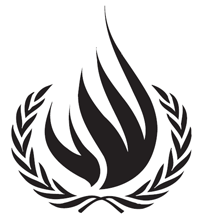
“Facts on the ground need to be established to help reduce the risk of radically different narratives being exploited for political ends. People need a reliable point of view to counter what has been widespread misinformation and also speech that aims to incite hatred on national, religious or racial grounds,” she added.
The report, which is based on information collected during two missions to Ukraine in March by Assistant Secretary-General for Human Rights Ivan Šimonović and a team of UN human rights monitors on the ground since 15 March, analyses events up to 2 April. It also anticipates and draws parallels between what happened in Crimea and events currently unfolding in eastern Ukraine.
“In eastern Ukraine, where a large ethnic Russian minority resides, the situation remains particularly tense,” the report says. “It will be important to immediately take initial measures to build confidence between the Government and the people, and among the various communities, and reassure all people throughout Ukraine that their main concerns will be addressed.”
Excessive use of force by the Berkut special police and other security forces led to the radicalisation of the protest movement, the report found. “Violations related to the Maidan protests should be investigated and addressed in order to ensure accountability of perpetrators,” the report states.
Information gathered so far indicates that 121 people were killed in violence between December 2013 and February 2014. Most acts of severe beatings, torture and other cruel, inhuman or degrading treatment were reportedly attributed to the Berkut.
The political aspects of recent developments in Crimea, which Mr Šimonović visited on 21 and 22 March, are beyond the report’s scope. However, the report notes that the situation created before and after the referendum of 16 March, which the General Assembly concluded had “no validity”, raised a number of human rights concerns pertaining to freedom of expression, freedom of assembly and other civil and political rights.
The presence of paramilitary and so-called self-defence groups as well as soldiers without insignia, was not conducive to an environment in which the will of voters could be exercised freely, and the UN Human Rights’ Office delegation received many reports of vote rigging.
“A number of measures taken in Crimea are deeply concerning from a human rights perspective,” the report says. These include the introduction of Russian citizenship, making it difficult for those who opt to maintain their Ukrainian citizenship to stay in Crimea. “The current situation also raises concerns with regard to land and property ownership, wages and pensions, health service, labour rights, education and access to justice,” the report adds.
The authorities in Crimea should also publicly condemn all attacks or harassment against human rights defenders, journalists or any members of the political opposition, the report urges, and ensure full accountability for such acts, through prompt, impartial and effective investigations and prosecutions.
It is widely assessed that while there were some attacks against the ethnic Russian community, these were neither systematic nor widespread. There are also allegations that some participants in the protests and clashes in eastern Ukraine were not from the region, and that some had come from the Russian Federation.
“What is clear from our findings is that there is an urgent need to ensure full respect for the rule of law and human rights in Ukraine and thus guarantee the enjoyment of all human rights for all, including minorities,” Pillay said.
“The international community, including the UN, can play a role in supporting the creation of such an environment. My Office and its monitoring team can provide impartial and authoritative human rights assessments to contribute to establishing the facts, de-escalating tension, and paving the way for an environment that is conducive to the holding of free and fair elections on 25 May,” the High Commissioner noted.
Among the report’s recommendations to the Government of Ukraine:
- Ensure accountability for all human rights violations committed during the unrest.
- Ensure inclusivity and equal participation in public affairs and political life.
- Prevent media manipulation by issuing timely and accurate information.
- Combat intolerance and extremism.
- Implement as a matter of priority measures to effectively eradicate corruption.
Among the recommendations to the authorities in Crimea:
- Actively resolve cases of missing persons, grant access to places of detention.
- Take all measures needed to protect the rights of persons affected by the changing institutional and legal framework, including citizenship.
- Investigate all allegations of hate speech and media manipulation.
- Ensure the protection of the rights of all minorities and indigenous peoples.
Regular reports shall be issued by the Human Rights Monitoring Mission in Ukraine (HRMMU), with one forecast for 15 May that will examine in greater depth the situation in eastern Ukraine.
ENDS
* Full report available here: http://www.ohchr.org/Documents/Countries/UA/Ukraine_Report_15April2014.doc
НАТО. Обвинения России: расставим точки над «и».
12 Apr 2014Агрессия России против Украины привела к международной изоляции России, включая полное приостановление практического сотрудничества с НАТО. Для того чтобы отвлечь внимание от своих действий, Россия выдвинула ряд обвинений против НАТО, основанных на неверной интерпретации фактов и упускающих из виду постоянные усилия НАТО по развитию партнерства с Россией. Россия также выступила с безосновательными выпадами против легитимности властей Украины и применила силу в целях захвата части территории Украины. Этот документ расставляет точки над «и».
Как передает МК, штурма здания Донецкой областной администрации, занятого митингующими, во вторник не будет, заявил назначенный Верховной радой вице-премьером Виталий Ярема, который в понедельник был отправлен в Донецк “для координации деятельности силовых структур”. 
По его словам, такое решение было принято по итогам переговоров с представителями активистов, находящихся в здании администрации, передает ИТАР-ТАСС. Как отмечают местные СМИ, в переговорах также принял участие украинский олигарх Ринат Ахметов.
Вместе с тем, речь может идти лишь об отсрочке силовых действий, необходимой Киеву, чтобы собраться с силами. Согласно информации МИД РФ, в юго-восточные районы Украины, в том числе в Донецк, стягиваются подразделения внутренних войск и национальной гвардии Украины с участием боевиков незаконного вооруженного формирования “Правый сектор“. По словам МИДа, они призваны подавить протесты жителей юго-востока страны против политики киевских властей.
“Особую тревогу вызывает то обстоятельство, что к этой операции подключены около 150 американских специалистов из частной военной организации “Greystone“, переодетых в форму бойцов подразделения “Сокол”, — говорится в сообщении российского дипломатического ведомства.
МВД Украины провело в Харькове анонсированную накануне “антитеррористическу операцию”, направленную на пресечение сепаратистских настроений в юго-восточных регионах страны. “Началась “антитеррористическая операция”. Центр города перекрыт. Не волнуйтесь. Завершим – откроем”, – цитирует ИТАР-ТАСС заявление главы милицейского ведомства Арсена Авакова.
Ранее на восток Украины были переброшены дополнительные спецподразделения милиции из других частей страны (в соцсетях между тем ходят слухи даже о присутствии в рядах силовиков американских наемников из печально известной фирмы Blackwater, ныне называемой Academi, изрядно оскандалившейся за время иракской кампании; украинские власти ранее не исключали обращения за помощью к иностранным экспертам, однако официальных сведений о приглашении в страну наемников не поступало. “Эти спецподразделения готовы решать оперативные задачи без оглядки на местные нюансы”, – приводит слова Авакова пресс-служба ведомства.
Как пишет МК, Blackwater USA была основана в 1997 году бывшим офицером спецназа ВМС США27-летним Эриком Принсом и тренером по прикладной стрельбе Элом Кларком, как охранная компания, которая будет заниматься поддержкой и подготовкой военных и правоохранительных операций. Принс окончил колледж Хилсдейл и работал стажёром в Белом Доме, затем окончил Военно-морскую академию и служил в подразделении «Морские котики». Деньги на покупку первого тренировочного центра и создание компании он получил в наследство, завещанное отцом. Тогда он купил участок площадью 24 км² на границе штатов Северная Каролина и Вирджиния. В этой местности вода в озере имела чёрный цвет из-за большого количества торфа, так компания и получила своё название Blackwater (Блэкуотер), что в переводе означает «Чёрная вода».
В 2002 году была создана компания Blackwater Security Consulting (BSC), сотрудники компании участвовали в войне в Афганистане. Сразу после падения режима Саддама Хусейна в 2003 году Blackwater появилась в Ираке, как одна из 60 охранных компаний, и стала заниматься обучением новых иракских вооружённых сил и полиции, а также поддержкой оккупационных сил. На момент вывода сил Blackwater из Ирака в стране присутствовало 987 наёмников, 744 из которых являлись гражданами Соединённых Штатов. Компания участвовала в Иракской войне до сентября 2009 года.
В октябре 2007 года Blackwater USA изменили название компании на Blackwater Worldwide и обнародовали новый логотип. В 2009 году основатель компании Эрик Принс ушёл с поста генерального директора, и в феврале Blackwater Worldwide официально сменила название на Xe, а также использует марку U.S. Training Center. Смену вывески связывают с чередой скандалов, сопровождавшей деятельность компании.
Так, в апреле 2004 года небольшая группа наёмников из компании, вместе с отделением морских пехотинцев США, обстреляли 400 иракских гражданских лиц, которые протестовали возле штаб-квартиры Временной Коалиционной администрации в Ан-Наджафе. В 2006 году в зелёной зоне Багдада произошла автомобильная авария. Внедорожник, управляемый сотрудниками Blackwater, врезался в Хамви армии США. Сотрудники Blackwater разоружили военнослужащих и заставили их лежать на земле под дулом пистолета до тех пор, пока они не смогли отогнать свой внедорожник от места аварии. 24 декабря 2006 года сотрудник компании, злоупотребив алкоголем, застрелил охранника вице-президента Ирака, попав в него из пистолета Глок три раза. Наёмник, совершивший этот поступок, был уволен из компании и депортирован из страны, больше никаких санкций к нему не применялось.
Компания стала печально знаменита в связи с инцидентом в сентябре 2007. 16 сентября 2007 года сотрудники Блэкуотер, охранявшие дипломатический конвой Госдепа США, на центральной площади Багдада устроили перестрелку, которая закончилась гибелью семнадцати и ранением восемнадцати мирных иракцев.
По результатам всех расследований выяснилось, что служащие фирмы с 2005 года по 2007 год участвовали в 195 перестрелках и в 84 % случаев они открывали огонь первыми.
Кроме того, Blackwater неоднократно подозревали в контрабанде оружия. Громким скандалом, произошедшим с охранной фирмой 9 марта 2010 года, стало расследование пропажи с американских складов в Афганистане более 500 автоматов Калашникова и другого оружия. 16 сентября 2010 года пятерым членам руководства Xe, включая исполнительного директора Гари Джексона, были предъявлены обвинения в незаконном обороте оружия.
Материалы от МК, ИТАР-ТАСС
The unofficial Crimean Tatars parliament voted in favor of seeking “national and territorial autonomy” following Crimea’s secession from Ukraine and annexation by Russia two weeks ago.
Crimean Tatars’ assembly leader Refat Chubarov told more than 200 delegates: “In the life of every nation there comes a time when it must make decisions that will determine its future.”
“I ask you to approve … the start of political and legal procedures aimed at creating ethnic and territorial autonomy of the Crimean Tatars of their historic territory of Crimea.”
The assembly also voted in favor of his proposal, made in the Crimean Tatars historic capital of Bakhchisaray. Chubarov said he expected both Kiev and Moscow to react to the decision to seek autonomy.
Refat Chubarov announced plans to negotiate with both Russia and Ukraine, as well as with the UN, European Council, EU, OSCE and the Organization of Islamic Cooperation.
Chubarov explained that the Crimean Tatars have studied Russia’s constitution and are aware of the regional laws governing subjects within the Russian Federation, and thus have decided to demand the right to self-determination.
Present at the assembly were the head of Russia’s Council of Muftis Ravil Gaynutdin and Rustam Minnikhanov, the president of Russia’s republic of Tatarstan. Both have guaranteed to help Crimean Tatars leaders meet and negotiate with authorities in Moscow.
The Russian and Ukrainian governments have voiced their support for the Crimean Tatars.
Reuters, Itar-Tass, Interfax
ПЕРВЫЙ “НАЦИОНАЛ-ПРЕДАТЕЛЬ” — КРЫМСКИЙ ТАТАРИН
27 Mar 2014Что ж, нас можно поздравить: в России уже начались разоблачения “национал-предателей”. Начались, как того требует время, с представителя “народа-предателя” — крымских татар.
В подконтрольной прессе, как по команде, появились заказные статьи об одном из самых ярких (это мое твердое мнение, а не фигура речи) представителей крымскотатарского народа — Ленура Ислямова.
В лучших традициях сталинско-геббельсовской прессы, не утруждая себя никакими доказательствами, их “авторы” утверждают, что Ленур — русофоб, исламист и чуть ли не террорист. Еще немного — и его “назначат” эмиссаром Аль-Каеды в Крыму. 
В Крыму — потому что Ленур Ислямов, абсолютно светский человек, гражданин России, москвич, предприниматель, решил помочь своему народу в возрождении культуры и языка на родине.
Вложив личные деньги, Ленур создал телеканал ATR — первое крымскотатарское телевидение. Которое всего за три года стало самым популярным в Крыму среди зрителей всех национальностей.
ATR вещает на трех языках (основной — русский), на канале выходят аналитические, культурные, просветительские, музыкальные, спортивные, кулинарные, детские и другие программы, лучшие ток-шоу в Крыму (зайдите на сайт atr.ua, посмотрите сами). Впрочем, тем, кто постоянно интересуется новостями, про ATR уже можно не рассказывать — в последние недели крымскотатарское ТВ смотрит не только вся Украина, но и весь мир, и думающие люди в России. Как самоотверженно сейчас работают журналисты ATR, каждый день ожидая закрытия новыми властями, тоже рассказывать не стоит: думаю, всем понятно.
А еще — в прошлом году Ленур исполнил мечту крымскотатарского народа, снял широкоформатный исторический фильм “Хайтарма” с участием известных российских и украинских актеров. Фильм — о трагедии депортации, в которой погибли четверо из десяти крымских татар. И о судьбе одного из лучших летчиков Великой Отечественной войны, дважды Героя Советского Союза Аметхана Султана.
Те, у кого повернулся язык назвать его русофобским, даже не посмотрев, — просто лишены совести. Это фильм о страшном сталинском преступлении, о любви и о чести людей всех национальностей.
Наконец, недавно Ленур запустил проект своей мечты — детский крымскотатарский телеканал LALE (“Тюльпанчик”), на котором дети слышат родной литературный язык. Чтобы было понятно, как это важно, поясню: из-за депортации и гонений своим языком хорошо владеет около 20% крымских татар. Вообразите такую ситуацию с русским языком — и придете в ужас.
И вот теперь за то, что Ленур делает для своего народа (а перечисленное — далеко не все, чем Ислямов помогает людям в Крыму), ему, похоже, придется заплатить.
Начались тотальные проверки в его московских предприятиях. Чем они закончатся — нетрудно предположить, несмотря на то, что Ленур законопослушный гражданин, и его бизнес прозрачен.
В заказных (приказных) статьях Ислямову фактически выдвинут ультиматум: или ты прекращаешь независимую работу ATR — или сядешь в тюрьму как лидер какой-нибудь радикальной исламистской группировки.
Принцип тот же, что при Сталине: был бы человек, а дело сошьется. По тем же лекалам, предполагаю, начнут шить дела и другим известным крымским татарам: исламский терроризм, подрывная деятельность, разжигание межнациональной розни — все то, чего никогда не было в Крыму. И о чем сейчас спешно лепят лживые телевизионные передачи.
Скоро Россия “узнает”, что Крым — логово террористов, и начнется новый круг хождения моего народа по мукам.
Боюсь, это и есть ответ на вопрос о гарантиях защиты крымскотатарского народа, данных президентом России в разговоре с Мустафой Джемилевым. Если самого Джемилева, известного во всем мире человека, личность масштаба Сахарова и Манделы, “новые власти” уже подумывают не пускать в Крым (возвращению в который своего народа он посвятил всю жизнь, проведя 15 лет в советских застенках) — то о каких правах для всех остальных может идти речь?
Боюсь, мой народ будут не защищать, а зачищать. Сначала от его лучших представителей, от интеллигенции, а затем и от всех, кто посмеет высказывать свое мнение.
Если так дела пойдут дальше, то основными правами крымских татар на собственной родине окажутся:
— право жить в моральном гетто — оскорбления по национальному признаку уже начались, крымских татар унижают на улицах, в школах, в транспорте, люди стараются не ходить нигде в одиночку;
— право молчать на своем, ставшем “государственным” языке.
Если моя страна, Россия, присоединяла мой Крым вот для этого, — то в истории имеется термин, который это описывает, и который я не хочу произносить. Если на государственных телеканалах начали обвинять евреев в Холокосте, то произносить его уже нет необходимости.
Blog – Ayder Muzhdabaev – Айдер Муждабаев – Facebook
Crimea. Mamchur, il nuovo eroe di Ucraina.
26 Mar 2014 Lui ci ha messo la faccia dimostrando un coraggio fuori dal comune, mentre gli altri – i suoi avversari – sono andati in giro mascherati o peggio i suoi superiori si sono nascosti a Kiev in una versione locale del nostro “8 settembre”. Il colonnello Julij Mamchur passerà alle storia di questa terribile pagina nei rapporti russo-ucraini come l’esempio di rettitudine da seguire, l’uomo che ha mantenuto il giuramento di servizio alla sua Patria. 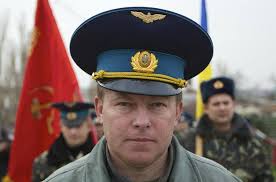
Il mondo l’ha conosciuto il 4 marzo scorso, quando ha portato i suoi sottoposti a marciare contro le unità speciali russe, che avevano occupato l’aeroporto di Belbek ad una ventina di chilometri da Sebastopoli. Le telecamere hanno immortalato la scena di queste centinaia di uomini disarmati, che cantavano l’inno nazionale, con in testa la bandiera sovietica da combattimento della Seconda guerra mondiale, quella ucraina ed il loro comandante. I russi sparavano per aria ed urlavano che avrebbero mirato alle gambe.
“Non ho avuto paura”, ha sempre detto il 42enne colonnello Mamchur che, in quei frangenti concitati, invitava i suoi uomini a stare tranquilli sotto alle raffiche di mitra e questi urlavano bestemmie ed invitavano i russi a sparare loro addosso.
“Vogliamo negoziare, chiamate i vostri comandanti”, sono state le parole del carismatico capo della 204esima Brigata tattica di aviazione, una volta arrivato a non più di un paio di metri per guardare negli occhi i suoi potenziali nemici, che hanno immediatamente chiesto per radio cosa fare.
Da quel momento Mamchur ha imbrigliato i russi per 18 giorni ed è diventato l’orgoglio di un Paese, l’eroe da ammirare.
Crisi di Crimea: Dove va l’Ucraina.
23 Mar 2014Dalla crisi in Crimea nasce il Vecchio Continente del 21esimo secolo: l’Ucraina di fatto entra in Ue e lo “scenario morbido” del post crollo dell’Urss, con le repubbliche ex sovietiche unite nella Csi, viene abbandonato.
Siamo di fronte non solo ad un brusco cambiamento degli equilibri geostrategici, imperanti negli ultimi due decenni, ma anche allo sgretolamento del mondo slavo orientale.
Dopo 360 anni di storia comune il divorzio dell’Ucraina con la Russia è ormai consumato e lo “Stato fuori dai blocchi, ponte tra Est ed Ovest”, voluto dal deposto presidente Viktor Janukovich, è un ricordo sbiadito. 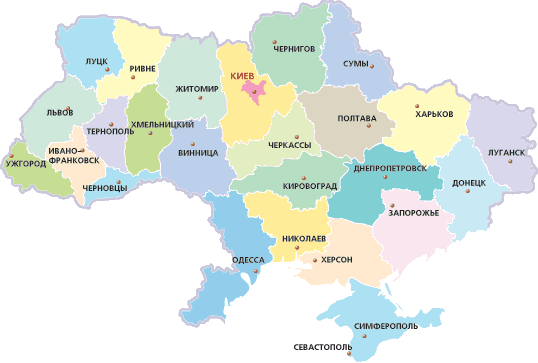
Le nuove autorità di Kiev hanno firmato il capitolato “politico” del patto di Associazione economica con l’Unione europea, causa prima del moto di protesta che ha generato l’“EuroMaidan” e, per reazione, la conseguente annessione da parte di Mosca della Crimea (regione russa, “regalata” all’Ucraina da Krusciov nel 1954, a suggello dei 3 secoli di amicizia tra i due popoli slavi orientali).
Ufficialmente il Cremlino si opponeva a tale accordo, giustificandosi con future possibili difficoltà commerciali tra le due repubbliche ex sovietiche. In realtà il problema era di altro genere: avvicinandosi così tanto all’Ue, Kiev avrebbe fatto saltare la nascita di una specie di “mini-Urss economica” voluta da Putin entro il 2015.
Alla vigilia della firma di Bruxelles l’Ucraina ha rinunciato alla presidenza di turno della Csi, la comunità sorta dalle ceneri dell’Urss, ed anzi, come la Georgia dopo la guerra con Mosca nell’agosto 2008, ha scelto di ritirare la sua adesione all’organizzazione.
L’obiettivo di Kiev, è inutile nasconderlo, è quello di una piena entrata come membro effettivo nell’Unione europea. Nel 2007 l’Ucraina faceva fatica a comprendere perché Bruxelles avesse accettato Bulgaria e Romania, Paesi di simili complessità economica ed ambientale, ma strategicamente meno importanti soprattutto dal punto di vista energetico.
Ed a questo punto, dopo quello che è avvenuto in Crimea, altro scenario non è ipotizzabile. Serviranno pertanto marce forzate ed imponenti investimenti europei ed americani. L’aspetto politico è il meno preoccupante: a parte le baltiche, l’Ucraina è l’unica repubblica ex sovietica dove veramente ha attecchito la democrazia. Difficilissimo è invece quello economico-finanziario.
Stando agli ultimi calcoli è necessario una specie di “piano Marshall”, circa 70-80 miliardi di euro, nel medio termine per ammodernare il tessuto industriale ucraino, troppo vecchio per concorrere in Ue e troppo dipendente dalla Russia. Da 3 a 7 miliardi sono solo da destinare ai gasdotti costruiti in epoca sovietica.
Tutta questa pioggia di soldi dovranno essere investiti con lo scopo di portare l’Ucraina al livello della Polonia odierna.
Ed in ultimo. L’attuale partita geostrategica costringerà i membri dell’Ue a muoversi una volta tanto insieme. A Kiev, forse, è anche nata una politica estera comune.
Gda
Владимир Путин подписал Федеральный конституционный закон «О принятии в Российскую Федерацию Республики Крым и образовании в составе Российской Федерации новых субъектов – Республики Крым и города федерального значения Севастополя» и Федеральный закон «О ратификации Договора между Российской Федерацией и Республикой Крым о принятии в Российскую Федерацию Республики Крым и образовании в составе Российской Федерации новых субъектов». 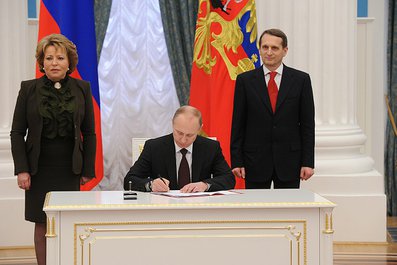
Справка к Федеральному конституционному закону «О принятии в Российскую Федерацию Республики Крым и образовании в составе Российской Федерации новых субъектов – Республики Крым и города федерального значения Севастополя», одобренному Государственной Думой 20 марта 2014 года, Советом Федерации 21 марта 2014 года
Федеральный конституционный закон подготовлен на основании результатов общекрымского референдума, проведённого 16 марта 2014 года в Автономной Республике Крым и городе Севастополе, на котором поддержан вопрос о воссоединении Крыма с Россией на правах субъекта Российской Федерации, Декларации о независимости Автономной Республики Крым и города Севастополя, Договора между Российской Федерацией и Республикой Крым о принятии в Российскую Федерацию Республики Крым и образовании в составе Российской Федерации новых субъектов, а также предложения Республики Крым и города с особым статусом Севастополя о принятии в Российскую Федерацию Республики Крым, включая город с особым статусом Севастополь.
Федеральным конституционным законом предусматривается принятие в Российскую Федерацию Республики Крым и образование в составе Российской Федерации новых субъектов: Республики Крым и города федерального значения Севастополя.
Федеральным конституционным законом решаются вопросы определения пределов территории Республики Крым и территории города федерального значения Севастополя, признания гражданства Российской Федерации у граждан Украины и лиц без гражданства, постоянно проживающих на территории Республики Крым или на территории города федерального значения Севастополя, а также вопросы воинской обязанности и военной службы.
Со дня принятия в Российскую Федерацию Республики Крым и образования в составе Российской Федерации новых субъектов и до 1 января 2015 года действует переходный период, в течение которого урегулируются вопросы интеграции новых субъектов Российской Федерации в экономическую, финансовую, кредитную и правовую системы Российской Федерации, в систему органов государственной власти Российской Федерации.
Федеральным конституционным законом предусматривается создание на территориях Республики Крым и города федерального значения Севастополя судов Российской Федерации, устанавливается порядок осуществления правосудия и порядок функционирования органов местного самоуправления в переходный период. На указанных территориях будут созданы органы прокуратуры, нотариальные и адвокатские палаты Республики Крым и города федерального значения Севастополя.
* * *
Справка к Федеральному закону «О ратификации Договора между Российской Федерацией и Республикой Крым о принятии в Российскую Федерацию Республики Крым и образовании в составе Российской Федерации новых субъектов», принятому Государственной Думой 20 марта 2014 года, одобренному Советом Федерации 21 марта 2014 года
Федеральным законом ратифицируется Договор между Российской Федерацией и Республикой Крым о принятии в Российскую Федерацию Республики Крым и образовании в составе Российской Федерации новых субъектов, подписанный в Москве 18 марта 2014 года.
WASHINGTON – The U.S. Department of the Treasury’s Office of Foreign Assets Control (OFAC) today designated sixteen Russian government officials, members of the Russian leadership’s inner circle, including a Russian bank pursuant to Executive Order (E.O.) 13661, which was signed by President Obama on March 16, 2014. E.O. 13661 authorizes sanctions on, among others, officials of the Russian Government and any individual or entity that is owned or controlled by, that has acted for or on behalf of, or that has provided material or other support to, a senior Russian government official. 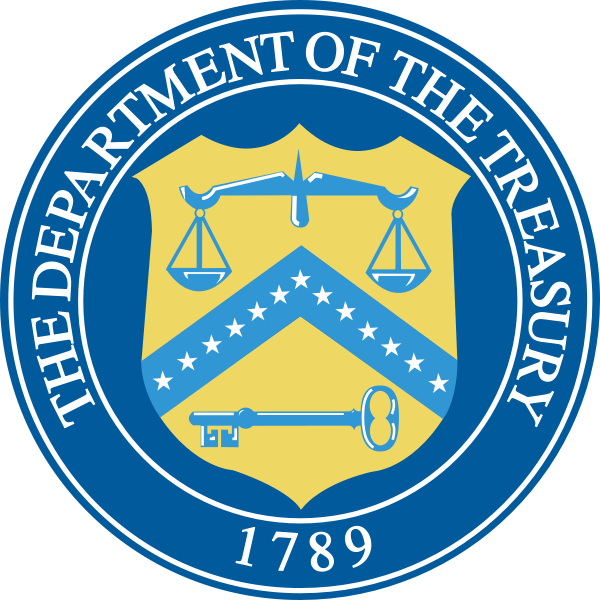
The sixteen individuals being sanctioned as Russian government officials are: Viktor Ozerov, Vladimir Dzhabarov, Evgeni Bushmin, Nikolai Ryzhkov, Sergei Zheleznyak, Sergei Mironov, Aleksandr Totoonov, Oleg Panteleev, Sergey Naryshkin, Victor Ivanov, Igor Sergun, Sergei Ivanov, Alexei Gromov, Andrei Fursenko, Vladimir Yakunin, and Vladimir Kozhin
Those being designated for acting for or on behalf of or materially assisting, sponsoring, or providing financial, material, or technological support for, or goods or services to or in support of, a senior official of the Government of the Russian Federation are: Gennady Timchenko, Arkady Rotenberg, Boris Rotenberg, Yuri Kovalchuk and Bank Rossiya. In addition to being designated for providing material support to Russian government officials, Bank Rossiya is also being designated for being controlled by designated inner circle member Kovalchuk.
“With its currency near an all-time low, its stock market down twenty percent this year and a marked rise in interest rates, Russia has already started to bear the economic costs of its unlawful effort to undermine Ukraine’s security, stability, and sovereignty,” said Under Secretary for Terrorism and Financial Intelligence David S. Cohen. “As President Obama has made clear, we will continue to impose costs in direct response to Russia’s provocative acts, even as we have made clear there is a path to de-escalate the situation in Ukraine that respects Ukraine’s sovereignty and territorial integrity and takes account of Russia’s legitimate interests.”
Russian Government Officials and Members of the Inner Circle:
Government Officials
The following sixteen individuals are being designated because they are officials of the Russian government. Although not the basis for the designation, several are also very close advisors to senior Russian government officials.
Viktor Ozerov is the Chairman of the Security and Defense Committee of the Federation Council of the Russian Federation. On March 1, 2014, Ozerov supported Russian President Vladimir Putin’s appeal regarding the use of the Russian Armed Forces in Ukraine.
Vladimir Dzhabarov is the First Deputy Chairman of the International Affairs Committee of the Federation Council of the Russian Federation. On March 1, 2014, Dzhabarov supported the Putin’s appeal regarding the use of the Russian Armed Forces in Ukraine.
Evgeni Bushmin is the Deputy Speaker of the Federation Council of the Russian Federation. On March 1, 2014, Bushmin publicly supported the deployment of Russian forces in Ukraine.
Nikolai Ryzhkov is a Senator in the Russian Upper House of Parliament (Federation Council). Ryzhkov publicly supported the deployment of Russian forces in Ukraine.
Sergei Zheleznyak is the Deputy Speaker of the State Duma of the Russian Federation.
Sergei Mironov is a Member of the Council of the State Duma, a Member of the State Duma Committee on Housing Policy and Housing and Communal Services, and Leader of the Fair Russia Faction in the Duma of the Russian Federation.
Aleksandr Totoonov is a Member of the Committee on Culture, Science, and Information, Federation Council of the Russian Federation. On March 1, 2014, Totoonov publicly supported the deployment of Russian forces in Ukraine.
Oleg Panteleev is the First Deputy Chairman of the Committee on Parliamentary Issues. On March 1, 2014, Panteleev publicly supported the deployment of Russian forces in Ukraine.
Sergey Naryshkin has been the Chairman of the Government Duma of the Federal Gathering of the Russian Federation since December, 2011. Additionally, he is a member of the National Security Council of the Russian Federation and of the United Russia party.
Victor Ivanov has been director of the Federal Drug Control Service (FSKN) of the Russian Federation since May 15, 2008; he was appointed as a member of the Security Council of the Russian Federation on May 25, 2008. Ivanov has served in a number of other government positions prior to that; he was Assistant to the President of the Russian Federation from 2004 – 2008; and Deputy Chief of the Administration of the Russian Federation from 2000 – 2004. Ivanov joined the KGB in 1977 and eventually rose to become the Deputy Director of the Federal Security Service. Ivanov is a close ally of Putin and served alongside Putin as the chief of staff of the St. Petersburg Mayor’s office in 1994 when Putin was first deputy head of the city’s administration.
Igor Sergun is the head of Russia’s military intelligence service (GRU) and is Deputy Chief of the General Staff.
Sergei Ivanov is the Chief of Staff of the Presidential Executive Office.
Alexei Gromov is the First Deputy Chief of Staff of the Presidential Executive Office.
Andrei Fursenko is an aide to the President of the Russian Federation and has been in that position since May 21, 2012. Fursenko has held a number of positions in the Government of the Russian Federation since 2001, including Minister of Education and Science from 2004 – 2012. Although not being designated for being a member of the Russian leadership’s inner circle, Fursenko first met Putin in 1993 and they remain closely associated.
Vladimir Yakunin was appointed as chairman of the board of the Russian state-owned company Russian Railways on June 15, 2005; he has remained as head of the company ever since. Yakunin is being designated because of his official position in the Russian government, but he is also a close confidant of Putin. Yakunin regularly consults with Putin on issues regarding the Russian Railways company. In addition, Yakunin accompanies Putin on many domestic and international visits. Yakunin met Putin while both were working in St. Petersburg. Yakunin decided to create a business center in the city and contacted Putin for his support. In addition, Yakunin became a member of the board of the Baltic Maritime Steamship Company on Putin’s instructions. Yakunin and Putin were also neighbors in the elite dacha community on the shore of Lake Komsomolsk and they served as cofounders of the Ozero Dacha Cooperative in November 1996.
Vladimir Kozhin was appointed the Head of Administration under the President of the Russian Federation by Putin on January 21, 2000. He has served continuously in that position until the present time. Kohzin is responsible for overseeing a staff of 60,000, over a hundred enterprises and institutions including the Kremlin and several other government buildings, and over four thousand vehicles. Kohzin’s positions have been variously referred to as Head of Administration, Head of the Presidential Affairs Office, Head of the Presidential Business Management Directorate of the Russian Federation, and head of the Presidential Property Management Directorate.
Members of the Inner Circle
The following individuals are being designated because each is controlled by, has acted for or on behalf of, or has provided material or other support to, a senior Russian government official.
Gennady Timchenko is one of the founders of Gunvor, one of the world’s largest independent commodity trading companies involved in the oil and energy markets. Timchenko’s activities in the energy sector have been directly linked to Putin. Putin has investments in Gunvor and may have access to Gunvor funds.
Arkady Rotenberg and Boris Rotenberg have provided support to Putin’s pet projects by receiving and executing high price contracts for the Sochi Olympic Games and state-controlled Gazprom. They have made billions of dollars in contracts for Gazprom and the Sochi Winter Olympics awarded to them by Putin. Both brothers have amassed enormous amounts of wealth during the years of Putin’s rule in Russia. The Rotenberg brothers received approximately $7 billion in contracts for the Sochi Olympic Games and their personal wealth has increased by $2.5 billion in the last two years alone.
Yuri Kovalchuk is the largest single shareholder of Bank Rossiya and is also the personal banker for senior officials of the Russian Federation including Putin. Kovalchuk is a close advisor to President Putin and has been referred to as one of his “cashiers.”
The following entity is being designated because it is controlled by, has acted for or on behalf of, or has provided material or other support to, senior Russian government officials.
Bank Rossiya (ОАО АБ РОССИЯ) is the personal bank for senior officials of the Russian Federation. Bank Rossiya’s shareholders include members of Putin’s inner circle associated with the Ozero Dacha Cooperative, a housing community in which they live. Bank Rossiya is also controlled by Kovalchuk, designated today. Bank Rossiya is ranked as the 17th largest bank in Russia with assets of approximately $10 billion, and it maintains numerous correspondent relationships with banks in the United States, Europe, and elsewhere. The bank reports providing a wide range of retail and corporate services, many of which relate to the oil, gas, and energy sectors.
As a result of Treasury’s action, any assets of the persons designated today that are within U.S. jurisdiction must be frozen. Additionally, transactions by U.S. persons or within the United States involving the individuals and entity designated today are generally prohibited.
Identifying Information
Name: Viktor Alekseevich Ozerov
DOB: January 5, 1958
POB: Abakan, Khakassia, Russia
Title: Chairman of the Security and Defense Committee of the Federation Council of the Russian Federation
Name: Vladimir Michailovich Dzhabarov
AKA: Vladimir Dzhabarov
DOB: September 29, 1952
Title: First Deputy Chairman of the International Affairs Committee of the Federation Council of the Russian Federation
Name: Evgeni Viktorovich Bushmin
AKA: Evgeny Bushmin
AKA: Yevgeny Bushmin
DOB: October 10, 1958
POB: Lopatino, Sergachiisky Region, Russia
Title: Deputy Speaker of the Federation Council of the Russian Federation
Name: Nikolai Ivanovich Ryzhkov
AKA: Nikolai Ryzhkov
DOB: September 28, 1929
POB: Duleevka, Donetsk Region, Ukraine
Title: Member of the Committee for Federal Issues, Regional Politics and the North of the Federation Council of the Russian Federation
Title: Senator in the Russian Upper House of Parliament
Name: Sergei Vladimirovich Zheleznyak
AKA: Sergei Zheleznyak
AKA: Sergey Zheleznyak
DOB: July 30, 1970
POB: Saint Petersburg, Russia
Title: Deputy Speaker of the State Duma of the Russian Federation
Name: Sergei Mikhailovich Mironov
AKA: Sergei Mironov
DOB: February 14, 1953
POB: Pushkin, Saint Petersburg, Russia
Title: Member of the Council of the State Duma, Member of the State Duma Committee on Housing Policy and Housing and Communal Services, and Leader of the Fair Russia Faction in the Duma of the Russian Federation
Name: Aleksandr Borisovich Totoonov
AKA: Alexander B. Totoonov
AKA: Alexander Totoonov
DOB: March 3, 1957
POB: Ordzhonikidze, North Ossetia, Russia
POB: Vladikavkaz, North Ossetia, Russia
Title: Member of the Committee on Culture, Science, and Information, Federation Council of the Russian Federation
Name: Oleg Evgenevich Panteleev
AKA: Oleg Panteleev
DOB: July 21, 1952
POB: Zhitnikovskoe, Kurgan Region, Russia
Title: First Deputy Chairman of the Committee on Parliamentary Issues
Name: Sergey Yevgenyevich Naryshkin
AKA: Sergei Naryshkin
DOB: October 27, 1954
POB: Saint Petersburg, Russia
Name: Victor Petrovich Ivanov
AKA: Viktor Ivanov
DOB: May 12, 1950
alt. DOB: 1952
POB: Novgorod, Russia
Name: Igor Dmitrievich Sergun
DOB: March 28, 1957
Title: Lieutenant General; Chief of the Main Directorate of the General Staff (GRU), Deputy
Chief of the General Staff
Name: Sergei Ivanov
AKA: Sergey Ivanov
DOB: January 31, 1953
POB: Saint Petersburg, Russia
Title: Chief of Staff of the Presidential Executive Office
Name: Alexei Gromov
DOB: 1960
POB: Zagorsk (Sergiev, Posad), Moscow Region, Russia
Title: First Deputy Chief of Staff of the Presidential Executive Office
Title: Presidential Administration Deputy Chief of Staff
Title: First Deputy Presidential Chief of Staff
Name: Andrei Alexandrovich Fursenko
AKA: Andrei Fursenko
AKA: Andrey Fursenko
DOB: July 17, 1949
POB: Saint Petersburg, Russia
Title: Aide to the President of the Russian Federation
Name: Vladimir Ivanovich Yakunin
DOB: June 30, 1948
POB: Zakharovo Village, Gus-Khrustalnyy Rayon, Vladimir Oblast, Russia
alt. POB: Melenki, Vladimir Oblast, Russia
Name: Vladimir Igorevich Kozhin
DOB: February 28, 1959
POB: Troitsk, Chelyabinsk Oblast, Russia
Name: Gennady Timchenko
AKA: Gennadiy Nikolayevich Timchenko
AKA: Gennady Nikolayevich Timchenko
AKA: Guennadi Timtchenko
Address: Geneva, Switzerland
DOB: November 9, 1952
POB: Leninakan, Armenia
alt. POB: Gyumri, Armenia
Nationality: Finland, Russia, Armenia
Name: Arkady Rotenberg
DOB: December 15, 1951
POB: Saint Petersburg, Russia
Name: Boris Rotenberg
DOB: January 3, 1957
POB: Saint Petersburg Russia
Name: Yuri Valentinovich Kovalchuk
AKA: Yury Valentinovich Kovalchuk
DOB: July 25, 1951
POB: Saint Petersburg, Russia
Name: Bank Rossiya
FKA: Aktsionerny BANK Russian Federation
Address: 2 Liter A Pl. Rastrelli, Saint Petersbrug, 191124, Russia
E-mail: bank@abr.ru
Web Site: www.abr.ru
SWIFT/BIC: ROSY RU 2P
Welcome
We are a group of long experienced European journalists and intellectuals interested in international politics and culture. We would like to exchange our opinion on new Europe and Russia.
Categories
- Breaking News (11)
- CIS (129)
- Climate (2)
- Energy&Economy (115)
- EU Eastern Dimension (85)
- Euro 2012 – Sochi 2014 – World Cup 2018, Sport (43)
- Euro-Integration (135)
- History Culture (198)
- International Policy (261)
- Military (74)
- Interviews (18)
- Italy – Italia – Suisse (47)
- Odd Enough (10)
- Poland and Baltic States (126)
- Religion (31)
- Russia (421)
- Survey (4)
- Turning points (4)
- Ukraine (176)
- Российские страницы (113)
Archives
- November 2020
- October 2020
- September 2020
- August 2020
- July 2020
- May 2020
- April 2020
- March 2020
- January 2020
- December 2019
- November 2019
- October 2019
- September 2019
- August 2019
- July 2019
- June 2019
- May 2019
- April 2019
- March 2019
- February 2019
- December 2018
- November 2018
- October 2018
- September 2018
- August 2018
- July 2018
- June 2018
- May 2018
- April 2018
- March 2018
- February 2018
- January 2018
- December 2017
- November 2017
- October 2017
- September 2017
- August 2017
- July 2017
- May 2017
- March 2017
- January 2017
- December 2016
- November 2016
- October 2016
- September 2016
- July 2016
- June 2016
- May 2016
- April 2016
- February 2016
- January 2016
- November 2015
- October 2015
- September 2015
- June 2015
- April 2015
- March 2015
- February 2015
- January 2015
- December 2014
- November 2014
- October 2014
- September 2014
- August 2014
- July 2014
- June 2014
- May 2014
- April 2014
- March 2014
- February 2014
- January 2014
- December 2013
- November 2013
- October 2013
- September 2013
- August 2013
- July 2013
- June 2013
- May 2013
- April 2013
- March 2013
- February 2013
- January 2013
- December 2012
- November 2012
- October 2012
- September 2012
- August 2012
- July 2012
- June 2012
- May 2012
- April 2012
- March 2012
- February 2012
- January 2012
- December 2011
- November 2011
- October 2011
- September 2011
- August 2011
- July 2011
- June 2011
- May 2011
- April 2011
- March 2011
- February 2011
- January 2011
- December 2010
- November 2010
- October 2010
- September 2010
- August 2010
- July 2010
- June 2010
- May 2010
- April 2010
- March 2010
- February 2010
- January 2010
- December 2009
- November 2009
- October 2009
- September 2009
- August 2009
Our books




